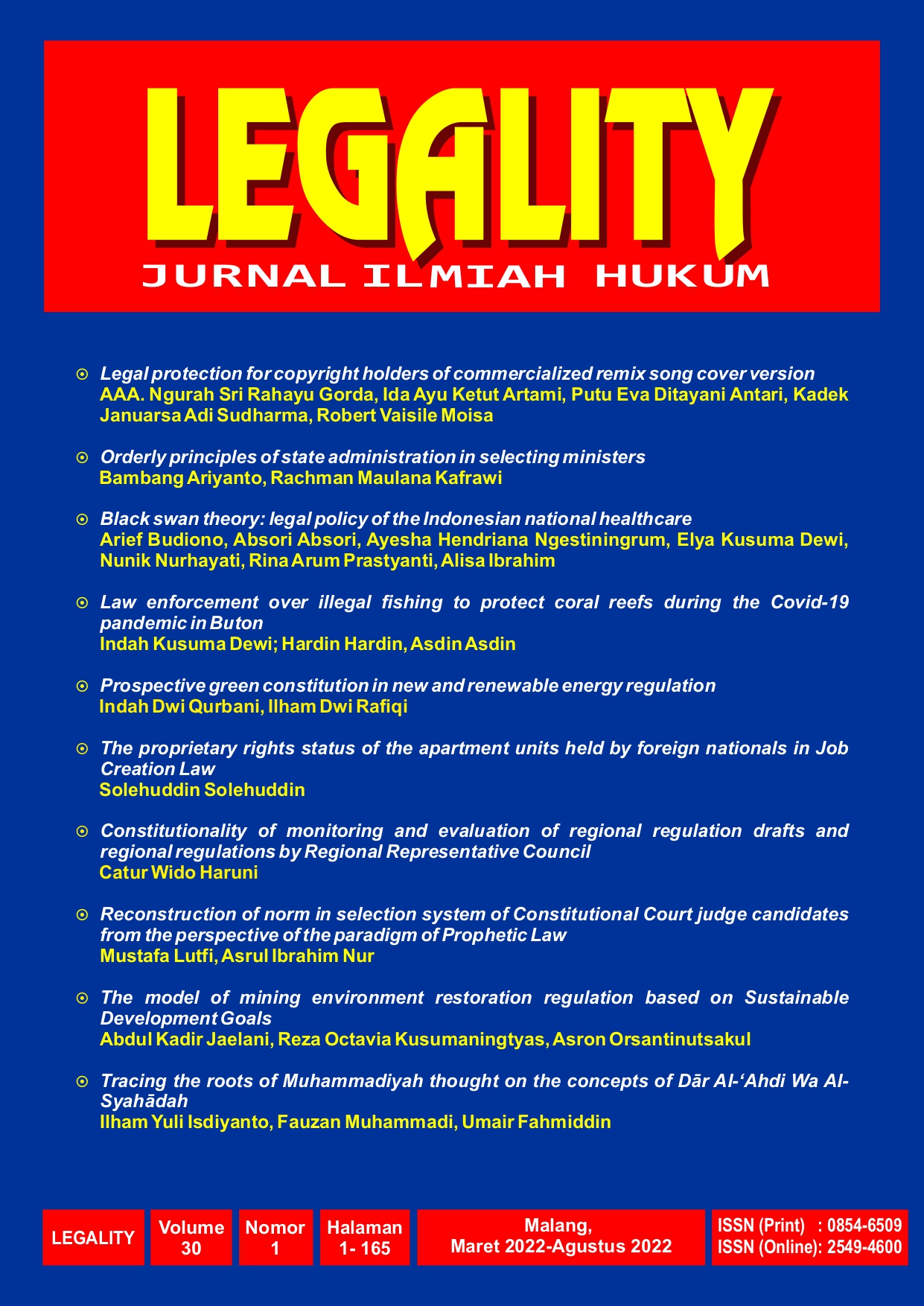Prospective green constitution in new and renewable energy regulation
DOI:
https://doi.org/10.22219/ljih.v30i1.18289Keywords:
New, Renewable energy, Green constitution, RegulationAbstract
The format for regulating new and renewable energy in the draft law on new and renewable energy in Indonesia still contains many polemics and problems. This is motivated by various problems of conception and substance in it, such as misconceptions about nomenclature, problems with institutional formats, licensing problems, and the accommodation of nuclear energy. This paper aims to analyze the potential impacts and prospects of energy using a green constitution point of view. This study used normative juridical research with a statutory and conceptual approach. The results show that the environment is the dominant entity affected by energy management and utilization activities, both fossil energy and new renewable energy with different potential impacts. The prospect of a green constitution has been contained in the draft law on new and renewable energy, but it cannot be realized optimally because transition policies in Indonesia still have dual orientations and overlapping arrangements. The principles of a green constitution can be a guiding concept and norm for the format of regulation and implementation of the use and utilization of new and renewable energy so that it is in line with the values of environmental protection and preservation.
Downloads
References
Al-Fatih, S., Ahsany, F., & Alamsyah, A. F. (2020). Legal Protection of Labor Rights During the Coronavirus Disease 2019 (Covid-19) Pandemic. Jurnal Pembaharuan Hukum, 7(2), 100–115. https://doi.org/10.26532/jph.v7i2.10975
Al-Fatih, S., & Aulia, F. I. (2021). Tanggung Jawab Negara Dalam Kasus Covid-19 Sebagai Perwujudan Perlindungan HAM (The State’s Responsibility in the Case of COVID-19 As a Realization of the Protection of Human Rights). Jurnal HAM, 12(3), 349–366. https://doi.org/10.30641/ham.2021.12.349-366
Arsita, S. A., Saputro, G. E., & Susanto, S. (2021). Perkembangan Kebijakan Energi Nasional dan Energi Baru Terbarukan Indonesia. Jurnal Syntax Transformation, 2(12), 1779–1788. https://doi.org/10.46799/jst.v2i12.473
Astra, I. M. (2010). Energi dan Dampaknya terhadap Lingkungan. Jurnal Meteorologi Dan Geofisika, 11(2), 130–134. http://dx.doi.org/10.31172/jmg.v11i2.72
Azhar, M., & Satriawan, D. A. (2021). Implementasi Kebijakan Energi Baru dan Energi Terbarukan Dalam Rangka Ketahanan Energi Nasional. Administrative Law & Governance (ALGJ), 1(4), 398–412. https://doi.org/10.14710/alj.v1i4.398-412
Coffey, C. (2003). The Draft Constitution for Europe: maintaining progress towards a green constitution. Institute for European Environmental Policy, 1–23. https://ieep.eu/publications/environmental-governance/the-draft-constitution-for-europe-maintaining-progress-towards-a-green-constitution
Diantari, R. A., Darmana, T., Zaenal, Z., Hidayat, S., Jumiati, J., & Soewono, S. (2019). Sosialisasi Energi Baru Terbarukan dan Lingkungan Hidup Untuk Masyarakat. Terang: Jurnal Pengabdian Pada Masyarakatq, 2(1), 1–11. https://doi.org/10.33322/terang.v2i1.538
Faisal. (2021). Urgensi Pengaturan Pengembangan Energi Terbarukan sebagai Wujud Mendukung Ketahanan Energi Nasional. Ensiklopedia Social Review, 3(1), 20. https://doi.org/https://doi.org/10.33559/esr.v3i1.675
Faiz, P. M. (2016). Perlindungan terhadap Lingkungan dalam Perspektif Konstitusi. Jurnal Konstitusi, 12(4), 771. https://doi.org/https://doi.org/10.31078/jk1344
Febriasari, D. F. R. & A. (2018). Model Kebijakan Pengembangan Energi Baru dan Terbarukan di Provinsi Banten. Jurnal Administrasi Publik, 8(2), 193. https://doi.org/https://doi.org/10.31289/jap.v8i2.1900
Georgeson, L., Maslin, M., & Poessinouw, M. (2017). The global green economy: a review of concepts, definitions, measurement methodologies and their interactions. Geo: Geography and Environment, 4(1), 51. https://doi.org/10.1002/geo2.36
Hafidz, J. (2011). Ekologi Konstitusional (Green Constitutional) dan Kedaulatan Wilayah di Indonesia. Jurnal Hukum, XXVI(2), 540. https://doi.org/http://dx.doi.org/10.26532/jh.v26i2.208
Handayani, I. G. A. K. R. (2012). Green Constitution sebagai Pengaturan Norma Hukum Lingkungan dan Pedoman Legal Drafting Pengaturan Daerah dalam Rangka Praktik-Praktik Tata Kelola Pemerintahan Yang Baik di Daerah. Yustisia Jurnal Hukum, 1(1), 135. https://doi.org/https://doi.org/10.20961/yustisia.v1i1.10612
Hansen, J., Kharecha, P., Sato, M., & Delmote, V. M. (2013). Point of No Return: The Massive Climate Threats We Must Avoid. Plos One, 8(12), 1–26. https://doi.org/10.1371/journal.pone.0081648
Herwastoeti. (2021). Revocation Of Business Competition Supervisory Commission Decisions Over Cartel-Related Cases In Indonesia. Audito Comparative Law Journal, 2(3), 171–178. https://doi.org/10.22219/aclj.v2i3.18167
Hidayah, N. P., Wiryani, F., & Madyasti, H. P. (2018). The Strengthening Legal Protection of Indigenous People in Facing Investment Climate in Era of Asean Economic Community in. IOP Conference Series: Earth and Environmental Science, 175(1), 1–5. https://doi.org/10.1088/1755-1315/175/1/012208
Irwansyah. (2017). Research-Based Environmental Law: The Debate Between Ecology Versus Development. Sriwijaya Law Review, 1(1), 51. https://doi.org/http://dx.doi.org/10.28946/slrev.Vol1.Iss1.8.pp044-066
Kholiq, I. (2015). Analisis Pemanfaatan Sumber Daya Energi Alternatif Sebagai Energi Terbarukan. Media Komunikasi, 19(2), 78–91. https://doi.org/10.31284/j.iptek.2015.v19i2.12
Kornelius Benuf, & Muhammad Azhar. (2020). Metodologi Penelitian Hukum sebagai Instrumen Mengurai Permasalahan Hukum Kontemporer. Gema Keadilan, 7(1), 20–33. https://doi.org/10.14710/gk.7.1.20-33
Kusuma, Z. F. R. dan B. M. A. (2016). Restorasi Ketahanan Energi: Analisis Kebijakan Konversi Sumber Energi Nasional dari Minyak ke Gas. Public Corner, 9(1), 1–2. https://doi.org/10.24929/fisip.v9i1.276
Laras A’nnisa, E. a. (2020). Analisis Konsumsi Energi Fosil, Emisi CO2, Konsumsi Energi Terbarukan dan Pertumbuhan Ekonomi terhadap Pengeluaran Kesehatan Indonesia Periode Tahun 2000-2017. Dinamic: Directory Journal of Economic, 2(2), 434–435. https://doi.org/https://doi.org/10.31002/dinamic.v2i2.1374
Lewis, B. (2012). Environmental Rights or Right to the Environment? Exploring the Nexus between Human Rights and Environmental Protection. Macquarie Journal of International and Comparative Environmental Law, 8(1), 36–47. https://ssrn.com/abstract=2673932
Lumbangaol, P. H. (2017). Energi Terbarukan untuk Pembangunan Berkelanjutan di Indonesia. Jurnal Teknik Nommensen, II(2), 1. https://doi.org/10.29122/jtl.v8i2.420
Meilani, H., & Wuryandani, D. (2010). Potensi Panas Bumi Sebagai Energi Alternatif Pengganti Bahan Bakar Fosil Untuk Pembangkit Tenaga Listrik di Indonesia. Jurnal Ekonomi & Kebijakan Publik, 1(1), 45–74. https://doi.org/10.22212/jekp.v1i1.74
Mulyana, I. (2018). Indonesia’s Regulation and Policy in the Energy Sector: Urgency to Promote Energy Efficiency in Urban Areas. Journal Yustisia, 7(2), 211. https://doi.org/https://doi.org/10.20961/yustisia.v7i2.18732
Nabila, F. (2016). Menjaga Kedaulatan Energi dengan Reformasi Kebijakan Diversifikasi Sumber Daya Energi. Jurnal Hukum Dan Pembangunan, Tahun ke-4(1), 149. https://doi.org/http://dx.doi.org/10.21143/jhp.vol45.no1.12
Nugroho, J. (2021). Ulasan Buku: 90 Tahun Prof. Emil Salim Pembangunan Berkelanjutan: Menuju Indonesia Tinggal Landas 2045. Syntax Literate, 6(2), 853–871. http://dx.doi.org/10.36418/syntax-literate.v6i2.2243
Nurlaila, A. T. Y. (2019). Perkembangan Energi Terbarukan di Beberapa Negara. Prosiding Seminar Nasional Infrastruktur Energi Nuklir 2019, 16. https://digilib.batan.go.id/e-prosiding/File Prosiding/Iptek Nuklir/SIEN2019/Prosiding_SIEN2019/DATA/11_Nurlaila.pdf
Nurmardiansyah, E. (2015). Konsep Hijau: Penerapan Green Constitution dan Green Legislation dalam Rangka Eco-Democracy. Viretas et Justitia, 1(1), 183–219. https://doi.org/https://doi.org/10.25123/vej.v1i1.1422
Prakoso, L. (2014). Green Constitution Indonesia: Diskurus Paradigma Pembangunan Berkelanjutan. Jurnal Hukum Dan Peradilan, 3(4), 127–136. https://doi.org/http://dx.doi.org/10.25216/jhp.3.2.2014.127-136
Rafiqi, I. D. (2021). Pembaruan Politik Hukum Pembentukan Perundang-Undangan di Bidang Pengelolaan Sumber Daya Alam Perspektif Hukum Progresif. Bina Hukum Lingkungan, 5(2), 320–321. https://doi.org/https://doi.org/10.24970/bhl.v5i2.163
Redi, A. (2015). Dinamika Konsepi Penguasaan Negara atas Sumber Daya Alam. Jurnal Konstitusi, 12(2), 404. https://doi.org/https://doi.org/10.31078/jk12210
Rudenko, D., & Tanasov, G. (2020). The Determinants of Energy Intensity in Indonesia. International Journal of Emerging Markets, 12(2), 192–214. https://doi.org/10.1108/IJOEM-01-2020-0048
Satriawan, M. A. & D. A. (2018). Implementasi Kebijakan Energi Baru dan Energi Terbarukan dalam Rangka Ketahanan Energi Nasional. Adminitrative Law & Governance Journal, 1(4), 399. https://doi.org/10.14710/alj.v1i4.398-412
Sonata, D. L. (2015). Metode Penelitian Hukum Normatif dan Empiris: Karakteristik Khas dari Metode Meneliti Hukum. FIAT JUSTISIA:Jurnal Ilmu Hukum, 8(1). https://doi.org/10.25041/fiatjustisia.v8no1.283
Sugiyono, A. (2020). Penggunaan Energi dan Pemanasan Global: Prospek bagi Indonesia. Makalah Tugas Ekonomi Lingkungan, Universitas Gadjah Mada, 1. https://doi.org/10.13140/2.1.2755.2646
Syaharani, S., & Tavares, M. A. (2020). Nasib Target Emisi Indonesia: Pelemahan Instrumen Lingkungan Hidup di Era Pemulihan Ekonomi Nasional. Jurnal Hukum Lingkungan Indonesia, 7(1), 1–27. https://doi.org/10.38011/jhli.v7i1.212
Weir, J. T. & T. (2015). Renewable Energy Resources (3rd Editio). Routledge. https://doi.org/10.4324/9780203478721
Wildermuth, A. J. (2011). The Next Step: The Integration of Energy Law and Environmental Law. Utah Environmental Law Review, 31(2), 369. https://ssrn.com/abstract=3707045
Yandri, E., Ariati, R., & Ibrahim, R. F. (2018). Meningkatkan Keamanan Energi Melalui Perincian Indikator Energi Terbarukan dan Efisiensi Guna Membangun Ketahanan Nasional Dari Daerah. Jurnal Ketahanan Nasional, 24(2), 239. https://doi.org/10.22146/jkn.30999
Downloads
Published
How to Cite
Issue
Section
License
Copyright (c) 2022 Indah Dwi Qurbani, Ilham Dwi Rafiqi

This work is licensed under a Creative Commons Attribution-ShareAlike 4.0 International License.










